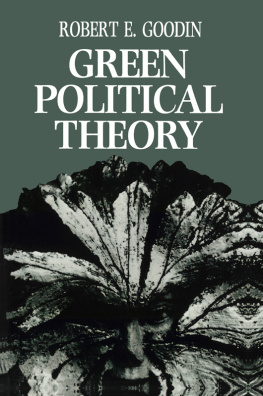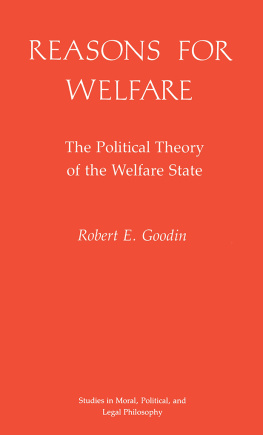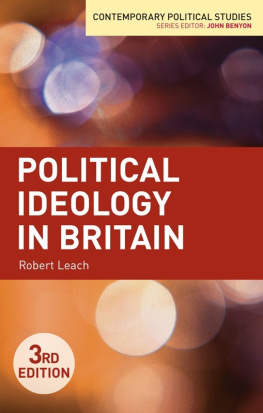Robert E. Goodin - Green Political Theory
Here you can read online Robert E. Goodin - Green Political Theory full text of the book (entire story) in english for free. Download pdf and epub, get meaning, cover and reviews about this ebook. year: 1992, publisher: Polity Press, genre: Science. Description of the work, (preface) as well as reviews are available. Best literature library LitArk.com created for fans of good reading and offers a wide selection of genres:
Romance novel
Science fiction
Adventure
Detective
Science
History
Home and family
Prose
Art
Politics
Computer
Non-fiction
Religion
Business
Children
Humor
Choose a favorite category and find really read worthwhile books. Enjoy immersion in the world of imagination, feel the emotions of the characters or learn something new for yourself, make an fascinating discovery.
- Book:Green Political Theory
- Author:
- Publisher:Polity Press
- Genre:
- Year:1992
- Rating:3 / 5
- Favourites:Add to favourites
- Your mark:
- 60
- 1
- 2
- 3
- 4
- 5
Green Political Theory: summary, description and annotation
We offer to read an annotation, description, summary or preface (depends on what the author of the book "Green Political Theory" wrote himself). If you haven't found the necessary information about the book — write in the comments, we will try to find it.
Green Political Theory — read online for free the complete book (whole text) full work
Below is the text of the book, divided by pages. System saving the place of the last page read, allows you to conveniently read the book "Green Political Theory" online for free, without having to search again every time where you left off. Put a bookmark, and you can go to the page where you finished reading at any time.
Font size:
Interval:
Bookmark:
Appendix:
The Green Political Programme

1 Green Plans and Priorities
As was made plain in the preface, the aim of this book is not to survey particular green movements in particular countries. This is a book of political theory, not of political anthropology. Still, the theoretical propositions which I advance do nonetheless rely on some image of what green parties are and what they want.
The account that follows is a highly stylized model of the political programme of a composite green party. Stylized and selective though it may be, I trust that my account of the green agenda is nonetheless broadly accurate as a description of green parties in general even if the level of generality means that it is necessarily slightly inaccurate as a description of any particular case.
The picture to be painted is a composite, in the sense that it will combine the political agenda of various different green parties worldwide rather than being a description of the proposals of any particular national green party or parties. Inevitably, I shall be drawing more heavily on some cases than others. I shall focus on the German, European, British and US cases, in particular. Skewed though this sample may be, I trust that the overall picture painted on the basis of it is broadly representative of the green movement worldwide.
Naturally, emphases vary (sometimes wildly) among green party programmes from locale to locale. Standing back a bit, though, we can see that there is enough commonality among them for a composite account genuinely to make sense. Where Scandinavians and Bavarians worry about acid rain destroying forests, Australians worry about wood-chipping of native rain forests; still, most greens worldwide worry about forests in general and about the destruction of the great tropical rain forests of the world in particular. Where British, French, German and US greens worry about the dangers of nuclear power plants, Norwegian greens worry about hydroelectric dams constricting all the nations free-flowing rivers; still, most greens worldwide worry about the environmental impact of high-consumption, electricity-dependent lifestyles. Where greens in urban centres (Berlin, Hamburg) and on the Eastern seaboard of North America worry largely about the impact of contemporary lifestyles on social relations, greens in more sparsely populated areas (Scandinavia, Australia, the American West) worry more about their impact on nature; still, most greens worldwide would agree that getting social relations right would be both the cause and the consequence of our achieving the right relations between humanity and nature.
The picture to be painted is not only a composite but is, furthermore, a highly stylized one. It abstracts from the details of particular policy proposals made by particular green parties, indicating instead merely the sorts of issues that worry greens and the flavour of the characteristically green response to them. To a certain extent, such stylization is inevitable whenever trying to present a composite account that straddles various different places and various different periods. Here it also serves a further function. It conveniently buffers my analysis from the effects of larger sociopolitical changes which will inevitably impact on green parties, along with all others.
Some new items are always coming on to the national political agenda, others are always passing off it. A detailed list of a partys present policy proposals will therefore quickly become dated. Much of what greens used to say about the stationing of nuclear-armed NATO troops in central Europe, for example, may soon happily have ceased to be relevant. If we are looking at the general style of a partys response rather than at its particular details, however, we might glean important clues as to how it would react to other, related issues in the future.
It is important, also, to say something about the green political package as a whole. It is not enough to ask what a party would do about each issue, one by one. We also have to look at the connections between a partys responses to related issues. We have to ask what lies at the core of their programme and what lies at its periphery. Where is the intellectual centre of gravity in their programme?
In conventional political discourse in debates between Labour and Tories in Britain, Social Democrats and Christian Democrats across Europe, Democrats and Republicans in the US, Labor and Liberals in Australia debates are usually organized around distributional issues. The defining question of politics is then seen to be who gets what, when and how? Parties are defined by their response to that question. Of course, they say much about other questions as well; sometimes those other responses are derived from their stance on the distributional question, sometimes not. But whatever they say about those other issues is somehow peripheral to their main, defining position their position on questions of distribution.
That is not the only possible way to organize political discourse, though. Consider the contrast with, for example, religious parties the Christian Peoples Party in Norway, say. Such parties also take stands on a wide variety of issues. Among them are issues of distribution. But from the perspective of parties such as these, it is the distributional planks in their platform which are peripheral and some other (religious or cultural) planks which are central. That does not make them single-issue parties, any more than the centrality of distributional concerns in the programmes of Tories or Labour makes them single-issue parties. It is just that the intellectual centre of gravity in their programme is located elsewhere than in the debate between mainstream parties.
The position of green parties is rather like that. They take stands on a whole panoply of political issues, as we shall see. They can credibly claim, by virtue of that, to be full-service political parties rather than single-issue movements. But while they take a stand on distributional issues, that is not what lies at the core of their programme. Rather, it is ecological values that form the focus of the green programme. Their stands on other issues are either derived from or peripheral to their stands on the questions of ecology, which they see as central.
The strategy of the greens is, in this regard, undeniably radical. Essentially, they are trying to shift the focus of discourse in the political community as a whole. Instead of centring on questions of where parties stand on the issue of how to cut the economic pie, green parties want to make the litmus test where parties stand on saving the planet.
It is a high-risk gambit, but one which if successful might prove politically devastating to traditional parties. For there is an impressive body of empirical research suggesting that elections are not won or lost by persuading voters that your partys solutions to any given problem are right and those of other parties wrong. Instead, parties own particular issues, and elections are won or lost by persuading voters that the issue on which this election ought be decided is one of those which your party happens to own. If, for example, a British election is fought on the issue of economic management, the Tories will almost inevitably
There are, then, two ways of viewing the fact that the focus of the green programme is orthogonal to the distributional cleavage dominating ordinary political debates. One is to say that green parties (as we would presumably want to say of religious parties, in most countries of the world) are simply out of touch with the electorate at large and are deliberately marginalizing themselves. The other is to say that green parties are playing a very smart political game, indeed, in trying to move the debate on to issues of environmental integrity which they have made their own. Therein, political scientists tell us, may actually lie their best chance of major and long-term political success.
Next pageFont size:
Interval:
Bookmark:
Similar books «Green Political Theory»
Look at similar books to Green Political Theory. We have selected literature similar in name and meaning in the hope of providing readers with more options to find new, interesting, not yet read works.
Discussion, reviews of the book Green Political Theory and just readers' own opinions. Leave your comments, write what you think about the work, its meaning or the main characters. Specify what exactly you liked and what you didn't like, and why you think so.










